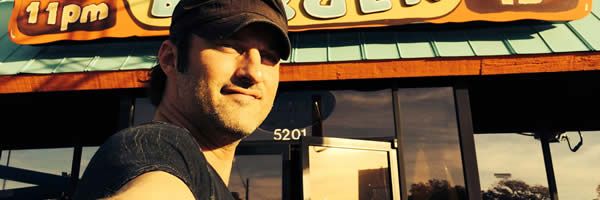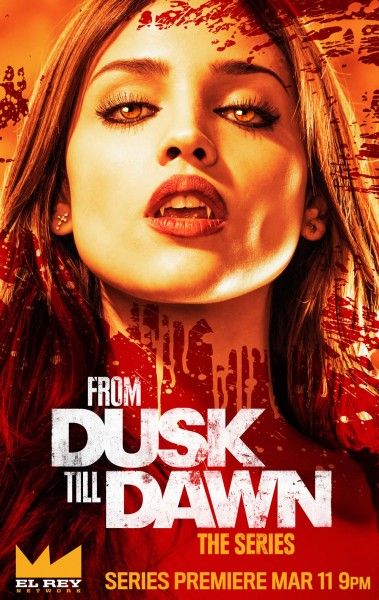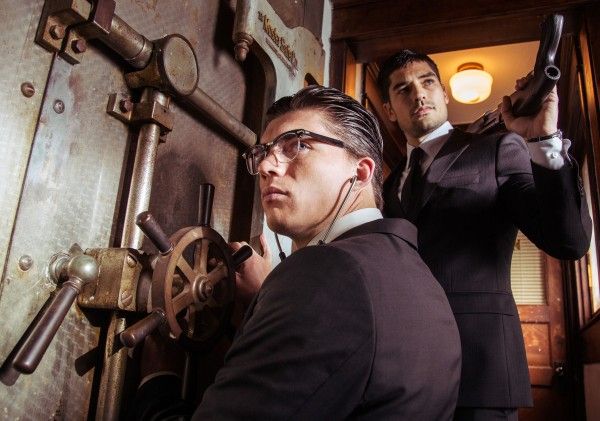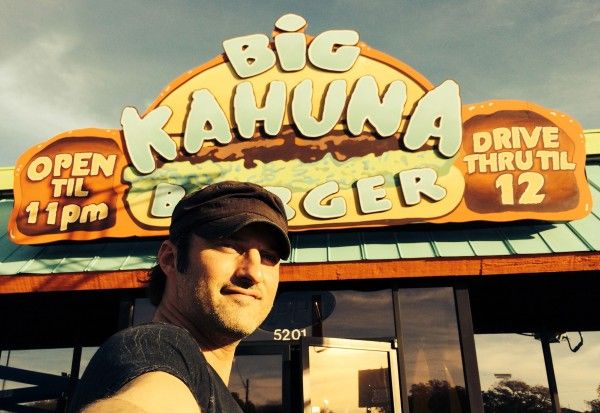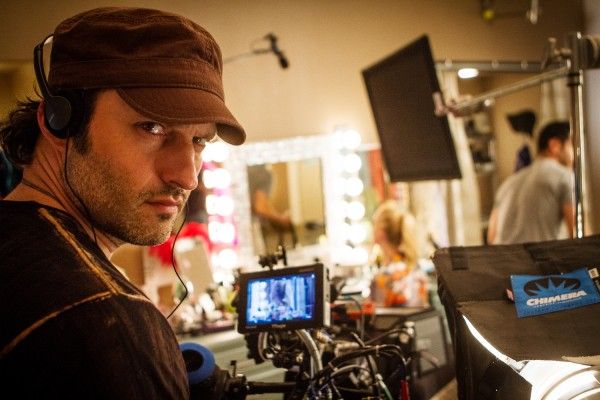El Rey is an English-language, general entertainment network, born out of the mind of prolific feature filmmaker, Robert Rodriguez. Conceived seven months ago and launched 27 days ago, having a filmmaker at the center of the network allows for an assembly of top talent that is unprecedented for a such a new network. As his first original series, Rodriguez is adapting his hit movie From Dusk Till Dawn into a TV series, which will premiere on March 11th, and stars Don Johnson, Wilmer Valderrama, Robert Patrick, Adrianne Palicki, DJ Cotrona, Jake Busey, Lane Garrison and Zane Holtz.
During the El Rey portion of the TCA Press Tour, Robert Rodriguez talked about the ideas behind El Rey, why he decided to do From Dusk Till Dawn as the network’s first original TV series, that each season will take place during the time period from dusk until dawn, how the story will be a partial retelling that then veers off into entirely new territory, and transitioning a movie into an episodic series. He also talked about which of his other films he’d like to see in as a TV series, the possibility of bringing Sin City to television, shooting Sin City 2 in 3D, to completely immerse audiences in the world, and that Nerveracker will be his next film, followed by Fire and Ice. Check out what he had to say after the jump.
What was your idea behind starting El Rey?
ROBERT RODRIGUEZ: This opportunity came up when Comcast was first putting these networks together, and I jumped at it. I had a full film career, but I was excited. Just as a personal reason, having five kids who are English-speaking Hispanic Americans that I knew didn’t see themselves represented in television, I thought this was an opportunity to build something that hadn’t been done before, which was to create a mainstream network that also catered to the growing English-speaking Hispanic audience because that’s what I’ve been doing through my whole film career. You don’t think of Desperado or Sin City or Spy Kids as being Hispanic films, but they are. They’re just for everyone to enjoy. And I thought, first and foremost, that would be a worthwhile endeavor because nobody was doing it and there was a need for it.
Second, I wanted to create a place that was a home for people who were diverse, young, vital, filmmakers, artists, writers and actors, and a place that they could come and share their sensibilities and have a direct pipeline into people’s homes.
And third, I always had a personal television network at home. I had a hard drive for years that had all my favorite shows, movies, trailers and short films. I would program it on a VLC list, like a playlist, and I would just have it playing. It was very soothing, just to see my favorite things playing. And people would come in and say, “What’s that you have on?,” and say, “That’s my own personal television network.” It was a joke, but it was actually really kind of cool. And I thought, “I wish somebody would curate a network where everything you saw attached to your sensibility and you’d know that you would be taken care of.” That was another reason to jump into this, and I couldn’t be more excited about it.
Why did you decide to do From Dusk Till Dawn as the first series?
RODRIGUEZ: I thought that would be a great way to introduce an audience to the network because it was a name that was known. It was one of the favorite movies that I did in the past, with Quentin [Tarantino], that people still come up to us about and say, “We watch From Dusk Till Dawn whenever it’s on television. We love From Dusk Till Dawn!” And there was so much that I wanted to explore in that movie that I didn’t get to. When I’d first gotten Quentin’s script, it took place in this bar in Mexico. I delved a little deeper into Mesoamerican mythologies, and Aztec and Mayan mythologies, and where a vampire culture could have existed back then, and found fascinating stuff that I only hinted at it a little bit in the movie. So, I really wanted to go back and enrich that whole experience. If the film was the short story, this series is the novel. You go places we only hinted at, in the television show. And Carlos Coto, our showrunner, and I have just had a blast making this a really rich experience, so that it feels like something that can go on and on for seasons. I also thought it would attract a lot of talent because people love that movie. We got an amazing cast. Greg Nicotero, who did make-up effects on the first From Dusk Till Dawn, is back. He’s on top of his game right now, and he’s creating the make-up effects again for us.
So, are you retelling the story of the movie From Dusk Till Dawn, or are you telling an entirely different story?
RODRIGUEZ: It’s a complete retelling of the original story for a bit, but then it goes into other areas. In the movie, you only heard about things like the bank heist in Abilene, or the break-out from the penitentiary and the trip to the Kahuna Burger. What really went on down there, fans of the movie never would have seen. But then, the stories have completely different motivations. Everybody is drawn to that place for a reason. If you’re familiar with the film, you will be continually surprised with what you see. It’s much more like reading a novel versus what might have been in the Reader’s Digest version, cut down. So, it’s a much richer experience. We want to retell it in a way to expand it, so that when we go into the next seasons, it makes more sense. We wouldn’t want to make seasons based on the film, but off something that has a much wider, deeper storytelling. That’s where the fun really comes in, exploring things that were only just ideas that we had, way back when. The video sequels were separate stories. They weren’t really tied into the mythology that we’re telling. This is really setting up a world that I always wanted to explore, and tried to hint at in the first film. Now, we’re really getting to pay it off, and it’s a blast. It’s really nice to have. And one thing I think the seasons will all have in common is they all take place from dusk until dawn. Within that time period, all of this is happening. It’s got a very visceral quality to it. But by about Episode 7, you’ll have no guide, at all, to what’s going to happen next because it’s completely different, by that point.
Does Dusk have your sense of humor?
RODRIGUEZ: Dusk is different. In the original film, it’s Quentin’s humor. It’s basically Quentin’s script and his humor, which is a little different than mine. In my own movies that I write, sometimes they’re a little more comical. His are funny, but they’re freaking scary and intense. That’s what Dusk brings, and that’s where I really wanted to go back to with some of that. I guess we wouldn’t really go right to Machete or Desperado right away because I want to open up. I don’t want it to just be my properties, and things that I would normally do. I really want to bring in a guy like Bob Orci and other filmmakers, who are pitching me ideas for shows, and really widen the breadth of the types of programming that we’ll have, so that people go, “Oh, it’s about that, too.” I’m the one starting the network, but it’s really to call other people, too. Using From Dusk Till Dawn as the lead shows the level of quality that we can achieve. People will then see the kind of budgets we have and the kind of shows they can do, and people are already bringing more ideas, just from the first preview they’ve seen.
Is it easy to transition a movie into an episodic series?
RODRIGUEZ: I felt like this would work really well for me because I tend to make the same movie, over and over, because I love the characters so much. I’ve done three or four franchises already because I don’t want to let the character go, and because I can’t cram the story into one movie. That’s how the Spy Kids series was. I had to cut out half of that and put it in Pt. 2. That’s where Pt. 2 came from. I wasn’t even trying to make a series. I just had so much story that I wanted to tell. With television, you can just tell so much more story. Quentin’s characters are the best. You could have a whole episode of two guys sitting in a car, riffing. So, the world is just so much richer than anything you could ever do in a movie. You’ve already seen the film. When you see the television series, you’ll go, “Wow, with television, you can tell so much more story that’s just so intriguing.” You can see why people are drawn to the medium. It’s the golden era of TV right now. Filmmakers are really being drawn to television because of the amount of story you can tell.
How do you like the speed of television?
RODRIGUEZ: I had always heard that television shoots really fast, and I was a little worried about that because I already shoot pretty fast. But, I got to television and found that it shoots at the same pace as my films. I was already shooting at a TV pace. My crew is already accustomed to that kind of speed and efficiency, and not wasting anything, and really making the project feel like it’s movie quality.
How many pages do you shoot a day?
RODRIGUEZ: We’re shooting about seven or eight days per episode. Even on a relaxed day, we’re getting 60-100 set- ups a day. We just know how to move very quickly and be very decisive.
You have a gift for absurdly great casting? How can we expect to see that play out on El Rey?
RODRIGUEZ: I just have a real love of actors and finding actors that I’m big fans of, and pairing them with parts that they don’t usually get to play. That’s usually why I’m able to cast really stellar actors. I’m not going to them and saying, “Hey, come do the same thing you just did.” I offer them a role they don’t usually get to play, with a level of creative freedom that’s just unprecedented because I have my own studio down there. There are no other producers around. There’s no one to tell them anything except, “Go.” And so, they really do love that. We have an incredible cast, just in Dusk, and we will continue that because when there’s quality work and that level of creative freedom, word gets out. Actors tell their friends. Robert DeNiro will show up in Machete because he heard from George Clooney that he should just go to Austin and enjoy the ride. People seek us out and ask, “Do you have anything for me? I want to go play in that world,” and you constantly try to think of how you can work with these people to give them the level of quality and the freedom that they don’t usually get. And El Rey will be a direct pipeline. I can say, “Come to me with an idea, and we’ll put it on the network, if we like it.” You have that level of freedom. You will never have that at any other network. That’s going to create a real groundswell of creative forces, not just for actors, but filmmakers, to come do things they’ve always dreamed of, and projects that they’ve always wanted that they didn’t think they could get on a network. No other network could have From Dusk Till Dawn because Quentin and I would never let a network take it. It will only be on El Rey. We’re going to try to do shows that can only exist on El Rey, that no one else can have.
Would you consider a Machete, El Mariachi or Spy Kids TV series?
RODRIGUEZ: That’s possible. It’s not what we have lined up first. I’d love to do a Saturday morning section, at some point, that has Spy Kids and Shark Boy together because kids freaking love Shark Boy. I wish I could put that on my network, but for right now, we’re really going towards the demographic that we really want to hit, then we can expand. Machete would fit, Mariachi would fit, and Desperado would fit.
Are there any other filmmakers you’re looking forward to working with?
RODRIGUEZ: I can’t say who they are yet, but we’ll announce those soon, the people that are going to be becoming a part of it. Because it’s a cool network and it’s independent, it feels like you’re not going to work for one of the traditional cable stations or networks. The creative freedom people would have when they come work with me on my movies, they’ll get the network level. Bob Orci had already done two pilots that hadn’t gotten picked up. He came to me with Matador and we talked about it, and I said, “Okay, you’re greenlit for 13 episodes. There’s no pilot you have to do. It’s guaranteed primetime with this budget.” He’d never had that experience before. So, that’s what people will get when they come and work for us.
How has the Sin City technology changed since the first film?
RODRIGUEZ: That technology has gotten much better. We shot in 3D, so it’s going to be as if you’re completely immersed in the Sin City world. What’s really great is just the stories and the characters. When you see the first trailer, you’re going to go, “Okay, I want to go there.” You so much want to go back to that world. That’s what I really love about TV. When we create something, we’ll be able to just keep people in that world because they love it. People are upset they have to wait so long. It’s seven years for another Sin City. If we’re going to make something and be innovative, and create something really cool, let’s just keep it going, so people can make that part of their diet.
Would you ever consider a Sin City series?
RODRIGUEZ: I can’t answer anything about that yet.
Will Fire and Ice be your next movie after Sin City 2?
RODRIGUEZ: Nerveracker, and then Fire and Ice.
From Dusk Till Dawn premieres on the El Rey Network on March 11th.

